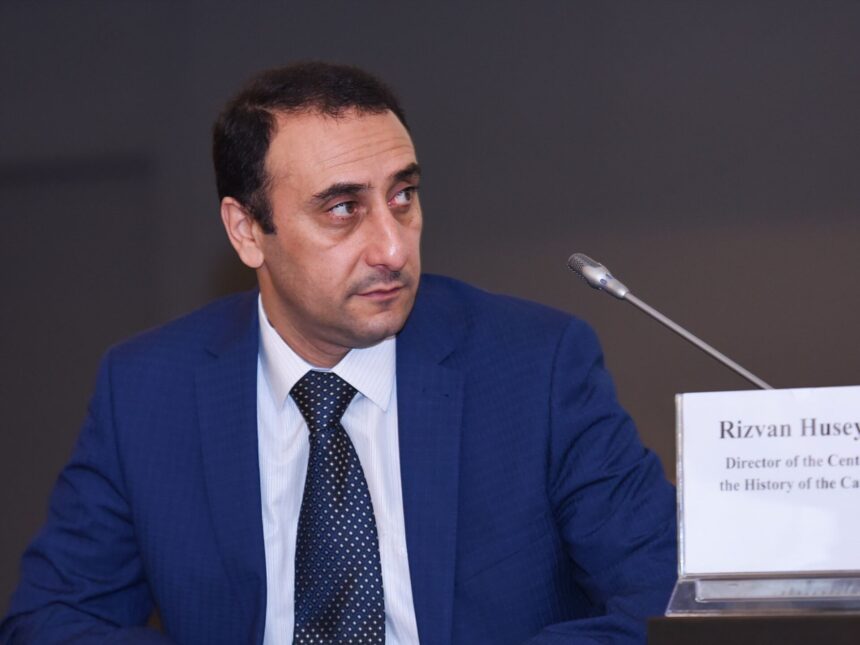Rizvan Huseynov is a senior researcher at the Institute of Law and Human Rights of the National Academy of Sciences of Azerbaijan, and since 2014, the director of the Center for Caucasus History. Since 2015, he has been an associate professor at the UNESCO Department for Comparative Studies of Spiritual Traditions, Specific Cultures, and Interreligious Dialogue in the North Caucasus. He is also the author of the TV project “Accusations of History” and several films.
Telegram channel: @RH_inside
This part of the text is a retrospective by the author, dated September 2023. The author kindly allowed Atlantis Org to create an opinion piece based on his speech during discussions with other experts. We strongly recommend that you read the first part of The Big Game in Transcaucasia before reading this piece.
All of this was locked away after the arrival of the tsarist Russia in the region, bringing with it a new Eurocentric philosophy of logistics. Under Peter the Great, a “window to Europe” was opened for the young Russian state, which has been relevant in every sense for the past 300 years. Thus, my “alarmism” over the last 15 years has been related to the fact that Russia lost the opportunity to prepare, at its own pace, for what is happening in the world today. Unfortunately, Russia did not do this. Meanwhile, Azerbaijan and its allies and partners did not waste any time. This was, of course, received ambiguously, including in the Russian expert and media space. Hence, the constant assertions and forecasts from a significant number of Russian experts and media that Azerbaijan would “betray Russia’s interests in favour of the West”. These forecasts turned out to be incorrect. During this time, Russia’s traditional historical allies, namely Georgia, Ukraine, and today Armenia, have turned towards the West, while Azerbaijan has neither left nor plans to leave anyone or anywhere. Any attempts to assert that Azerbaijan has some clear pro-Western position have proven to be fundamentally wrong. Azerbaijan has always had and continues to have its own interests, primarily economic ones. Our economy precedes politics. I think this is very important. And I would very much like it to be the same in Russia: to abandon the use of force where there is still no stable project, where only reactive policies are being pursued. Force without a project has repeatedly proven its ineffectiveness. Such “force” usually ultimately serves the interests of other external players.

Peter the Great and his “window to Europe”. Photo
In light of the current events in our region, all eyes are now on the territory of Armenia that we refer to as Zangezur (known to Armenians as Syunik), where the Zangezur Corridor or road will be established. The clash of significant interests in this context naturally raises concerns, as there is a risk of Armenia becoming a “bone of contention”, much like Syria. Unfortunately, we are witnessing a process of “Syria-ization” in Armenia, which Azerbaijan and its partners do not want.
Respected speakers have suggested that Azerbaijan could use force to resolve the issue of the Zangezur road, but it has chosen not to do so. I agree with this stance, as Azerbaijan’s goal is not a forceful solution. Instead, the objective is to achieve harmony, stability, and prosperity for the entire South Caucasus region.
For example, our partner Georgia sometimes has mixed feelings about Azerbaijan’s efforts to potentially involve Armenia in these projects, particularly the so-called “Middle Corridor”. This corridor would connect China through Uzbekistan and Kazakhstan, possibly directly from China, and then transit through the Caspian region into Azerbaijan, continuing through Georgia and potentially Armenia and Iran. From there, it would extend to Turkey and eventually reach Southeast Europe and the Mediterranean.
This is an Eurasian project, not an Atlanticist one.


Leave a Reply